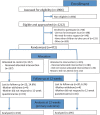A Randomized Controlled Trial of Innovative Postpartum Care Model for Mother-Baby Dyads
- PMID: 26871448
- PMCID: PMC4752489
- DOI: 10.1371/journal.pone.0148520
A Randomized Controlled Trial of Innovative Postpartum Care Model for Mother-Baby Dyads
Abstract
Objective: To evaluate the efficacy, safety, and maternal satisfaction of a newly established integrative postpartum community-based clinic providing comprehensive support for mothers during the first month after discharge from the hospital. Our primary interests were breastfeeding rates, readmission and patient satisfaction.
Methods: A randomized controlled trial was conducted in Ottawa, Canada, where 472 mothers were randomized via a 1:2 ratio to either receive standard of care (n = 157) or to attend the postpartum breastfeeding clinic (n = 315). Outcome data were captured through questionnaires completed by the participants at 2, 4, 12 and 24 weeks postpartum. Unadjusted and adjusted logistic regression models were conducted to determine the effect of the intervention on exclusive breastfeeding at 12 weeks (primary outcome). Secondary outcomes included breastfeeding rate at 2, 4 and 24 weeks, breastfeeding self-efficacy scale, readmission rate, and satisfaction score.
Results: More mothers in the intervention group (n = 195, 66.1%) were exclusively breastfeeding at 12 weeks compared to mothers in the control group (n = 81, 60.5%), however no statistically significant difference was observed (OR = 1.28; 95% CI:0.84-1.95)). The rate of emergency room visits at 2 weeks for the intervention group was 11.4% compared to the standard of care group (15.2%) (OR = 0.69; 95% CI: 0.39-1.23). The intervention group was significantly more satisfied with the overall care they received for breastfeeding compared to the control group (OR = 1.96; 95% CI: 3.50-6.88)).
Conclusion: This new model of care did not significantly increase exclusive breastfeeding at 12 weeks. However, there were clinically meaningful improvements in the rate of postnatal problems and satisfaction that support this new service delivery model for postpartum care. A community-based multidisciplinary postpartum clinic is feasible to implement and can provide appropriate and highly satisfactory care to mother-baby dyads. This model of care may be more beneficial in a population that is not already predisposed to breastfeed.
Trial registration: ClinicalTrials.gov NCT02043119.
Conflict of interest statement
Figures
References
-
- World Health Organization. WHO recommendations on postnatal care of the mother and newborn. World Health Organization, 2014. - PubMed
Publication types
MeSH terms
Associated data
LinkOut - more resources
Full Text Sources
Other Literature Sources
Medical



